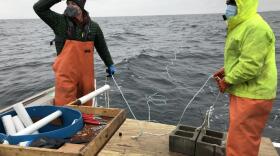Fred Bever
A Columbia University graduate, Fred began his journalism career as a print reporter in Vermont, then came to Maine Public in 2001 as its political reporter, as well as serving as a host for a variety of Maine Public Radio and Maine Public Television programs. Fred later went on to become news director for New England Public Radio in Western Massachusetts and worked as a freelancer for National Public Radio and a number of regional public radio stations, including WBUR in Boston and NHPR in New Hampshire.
Fred formerly was Maine Public Radio’s chief political correspondent from 2001 to 2007 and returned to Maine Public Radio in early 2016 as a news reporter and producer, covering a wide variety of topics across Maine and the region.
-
A federal investigation of allegations that China is illegally avoiding duties on solar panels sold to U.S. companies is putting the brakes on the nation's solar power build-out.
-
A lot of Americans learned to shuck oysters and cook fish at home during the pandemic. Now that restaurants are getting back to normal, there's a supply crunch.
-
A Maine startup is drawing high-profile support for its low-tech plan to soak up carbon emissions. It says its kelp farms will sink to the ocean floor and lock the carbon away for millennia.
-
Maine's economy relies heavily on summer tourism. With Memorial Day around the corner, many business owners are figuring out when and whether they'll be allowed to reopen.
-
Maine's coastal waters are warming quickly. Lobster may not be abundant forever so fishermen are finding new ways to make a living on the water.
-
Dealers ship millions of dollars' worth of live Maine lobster to China but much of that business may be headed to Canadian lobstermen after hefty new tariffs.
-
Begging is an ancient practice, and in recent years U.S. cities have been cracking down on panhandlers. But now a handful are trying a different approach — paying panhandlers to work.
-
The recovery of the bald eagle is bad news for herons, loons and other rare birds. Their numbers are being decimated by eagles who prey upon them.
-
Why are chefs adopting sea greens in their cuisine? They're tasty and nutritious, and growing them is good for the planet. Maine's budding seaweed business is boosting an endangered coastal economy.
-
U.S. drug officials have traced a sharp spike in the already climbing death toll from heroin overdoses to an additive — acetyl fentanyl. The fentanyl is being cooked up in clandestine labs in Mexico.






